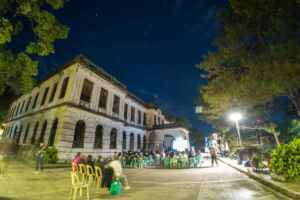BAGUIO CIRCULAR ECONOMY PROGRAM PRAISED FOR SOCIAL, CULTURAL INCLUSIVITY
Baguio City’s implementation of the Circular Economy (CE) “Pansa-nopen Tayo” program to reduce and convert wastes into resources
has been praised for living by the CE’S social inclusivity and cultural ideals that ensure that no sector will be left out in its shift to sustainable waste management. “The European Union and the United Nations Development Programme are very much impressed with how Baguio is running its CE initiatives. So far it is the only local government unit in the country to have captured the social inclusion and cultural approach of a circular economy,” Dr. Marjorie Balay-as, Local Government Unit and Stakeholder Engagement Specialist for Baguio, said.
Balay-as said the city successfully incorporated the principles of gender equality, disability and social inclusion (GEDSI) and even the indigenous community practices in its CE programs as gleaned from the final work plan it submitted to the EU-Green Economy Programme in the Philippines (EU-GEPP) as one of the beneficiaries of the Green LGUs Project. She said that in the three portfolios focusing on the barangay, education and tourism sectors, Baguio did not only focus on the shift to CE but ensured that its transition to CE is “socially just and restorative” by making sure that the marginalized and the vulnerable sectors will not be displaced or left out.
For instance in the program to upgrade the materials recovery facilities (MRFs) in the barangays, the city saw to it that the waste pickers or those in the informal waste sector will not be deprived of livelihood and instead will be made part of the formal waste sector. Moreover, in co-designing the existing MRFs, the city made sure that the laws and principles governing gender equality and disability were taken into account. Indigenous knowledge, systems and practices were also integrated in the programs.
The city conducted a value chain analysis using indigenous cultural approach Happy Hollow barangay to map natural and cultural heritage products and indigenous waste management practices that can be adopted to boost CE program implementation and these were also included in the work plan. “Baguio’s CE program is on the right track. It stands out and it is unique because of the integration of IP perspectives, knowledge and practices and inclusion of the voices of the GEDSI group in all the aspects and processes of the circular economy,” she said. Mayor Benjamin Magalong has pushed for the city’s shift to CE saying it is the best way to attain the city’s goals of sustainability and resiliency amid the challenges of urban decay and climate crisis.
APR/Baguio-PIO
Metro BLISTT
ARAW NG KALAYAAN GINUNITA SA BAGUIO
June 14, 2025
MEAT MISHANDLING
June 14, 2025
439 VIOLATORS APPREHENDED IN BCPO’S INTENSIFIED IMPLEMENTATION OF THE KING OF THE ROAD ORDINANCE
June 14, 2025
62 KASO NG KARAHASAN NAITALA SA UNANG QUARTER SA BAGUIO
June 14, 2025
CITY COMMENDS BAGUIO CITY POLICE OFFICE
June 14, 2025
GARBAGE SEGREGATION, MAHIGPIT NA IPINAPATUPAD NG GSO
June 14, 2025





